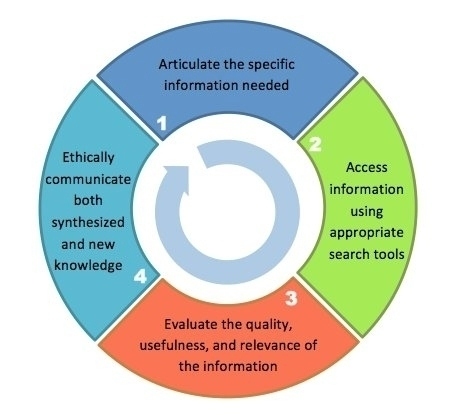Information Literacy Core Competencies
The ILCC page is no longer maintained or supported by the University Libraries, and will be removed on January 4th, 2023.
Definition of information literacy
Information literacy is the ability to identify, access, evaluate, and synthesize multiple forms of information. Information is expressed in many forms: text, data, images, and multimedia. Becoming information literate is a multi-step, iterative process that includes articulating the need for information; finding information efficiently; thinking critically about resources; managing the abundance of information available; using information ethically; synthesizing and incorporating information into one’s knowledge base; and creatively expressing and effectively communicating new knowledge.

About the ILCCs
The Information Literacy Core Competencies (ILCCs) were developed by the Grand Valley State University Libraries to provide a shared language about information literacy skills and how those skills reach across the curriculum.
These ILCCs were mapped wherever possible to GVSU’s General Education Program guidelines.
Although a hierarchical numbering system was imposed on these skills goals in order to make conversation about them easier, the skills may not always be acquired in sequence. The scaffolding of these skills will be dependent on the students’ specific information needs and existing skills.
Faculty may use these ILCCs to:
- Collaborate on assignment creation
- Coordinate syllabi across a department
- Provide a framework for faculty workshops and professional development
- Write learning outcomes for assessment
- Make information literacy more transparent
1. Articulate the specific information needed
1.1 Introductory
1.1.A. Define the topic
1.1.B. Identify key concepts related to topic
1.1.C. State an appropriate focus for topic
1.1.D. Locate sources for background information on topic
1.1.E. Identify various sources of help in searching (e.g. library and classroom faculty, library staff, peers, subject guides, etc.)
1.2 Intermediate
1.2.A. Revise the topic based on preliminary searching
1.2.B. Write research question or thesis statement within the context of discipline
1.2.C. Use discipline-specific terminology for key concepts of topic
1.2.D. Identify core subject research databases
1.2.E. Identify government sources
1.3 Advanced
1.3.A. Develop an original research question that contributes to the body of knowledge in the field.
2. Access information using appropriate search tools
2.1 Introductory
2.1.A. Conduct basic keyword searches
2.1.B. Locate known item
2.1.C. Select search tools most appropriate for topic
2.1.D. Revise searches based on the results of preliminary searching
2.1.E. Recognize tools for acquiring resources outside of GVSU collections (e.g. Document Delivery, interlibrary loan, open access materials, etc.)
2.1.F. Choose a strategy for logging and retrieving information found
2.2 Intermediate
2.2.A. Use advanced search features in subject research databases
2.2.B. Locate a breadth of primary and secondary sources of information in the field
2.2.C. Use a variety of sources for information and help
2.2.D. Interpret and use citations to find additional literature
2.2.E. Use tools for acquiring resources outside of GVSU collections (e.g. Document Delivery, Interlibrary Loan, Google Books, Google Scholar, Open Access Materials, etc.)
2.2.F. Use a citation management system (e.g. Zotero or Endnote)
2.3 Advanced
2.3.A. Seek primary sources from foundational theorists and practitioners
2.3.B. Use current awareness technologies (e.g. RSS, blogs) to stay informed about research
3. Evaluate the quality, usefulness, and relevance of the information
3.1 Introductory
3.1.A. Differentiate between scholarly, trade, and popular sources
3.1.B. Evaluate resources for authority, accuracy, reliability, coverage, and timeliness
3.1.C. Evaluate found resources for relevance to topic
3.1.D. Describe the publication lifecycle
3.1.E. Describe differences between Google and the library
3.2 Intermediate
3.2.A. Define peer-reviewed
3.2.B. Select peer-reviewed sources when appropriate
3.2.C. Identify possible biases within an information source
3.2.D. Employ review tools to evaluate information sources (e.g., book reviews, annotated bibliographies, etc.)
3.2.E. Choose internet sources from outside the library when appropriate
3.3 Advanced
3.3.A. Differentiate between types of research (e.g. qualitative, quantitative, etc.)
3.3.B. Evaluate research methods within studies
3.3.C. Identify research biases within studies
3.3.D. Assess key sources of information using formal evaluation criteria (e.g. journal impact factors)
3.3.E. Explain the financial forces driving the availability of information
4. Ethically communicate synthesized knowledge
4.1 Introductory
4.1.A. Check for accuracy of citations and references
4.1.B. Label ideas and quotes from others
4.1.C. Outline information found
4.1.D. Infer relationships among multiple sources
4.1.E. Match communication style to the target audience
4.2 Intermediate
4.2.A. Explain ethical and legal considerations specific to the discipline
4.2.B. Select appropriate information to synthesize from multiple sources
4.2.C. Summarize information found
4.2.D. Formulate a logical conclusion with sufficient evidence
4.2.E. Identify post-graduate resources for personal and professional development
4.3 Advanced
4.3.A. Adhere to professional ethical guidelines (e.g. HIPAA, FERPA, HRRC/IRB, etc.)
4.3.B. Choose whether to retain author rights for future research output
4.3.C. Archive completed work to ensure its future accessibility
4.3.D. Share findings with peers beyond the classroom
Contributing Authors
Revised, 2013: Sarah Beaubien, Emily Frigo, Mary O’Kelly, Kathryn Waggoner – Grand Valley State University Libraries
Original, 2010: Sarah Beaubien, Emily Frigo, Mary O’Kelly, Kim Ranger, Jodi Tyron – Grand Valley State University Libraries
 Bookmark link for this page:
https://www.gvsu.edu/library/ilcc
Bookmark link for this page:
https://www.gvsu.edu/library/ilcc

